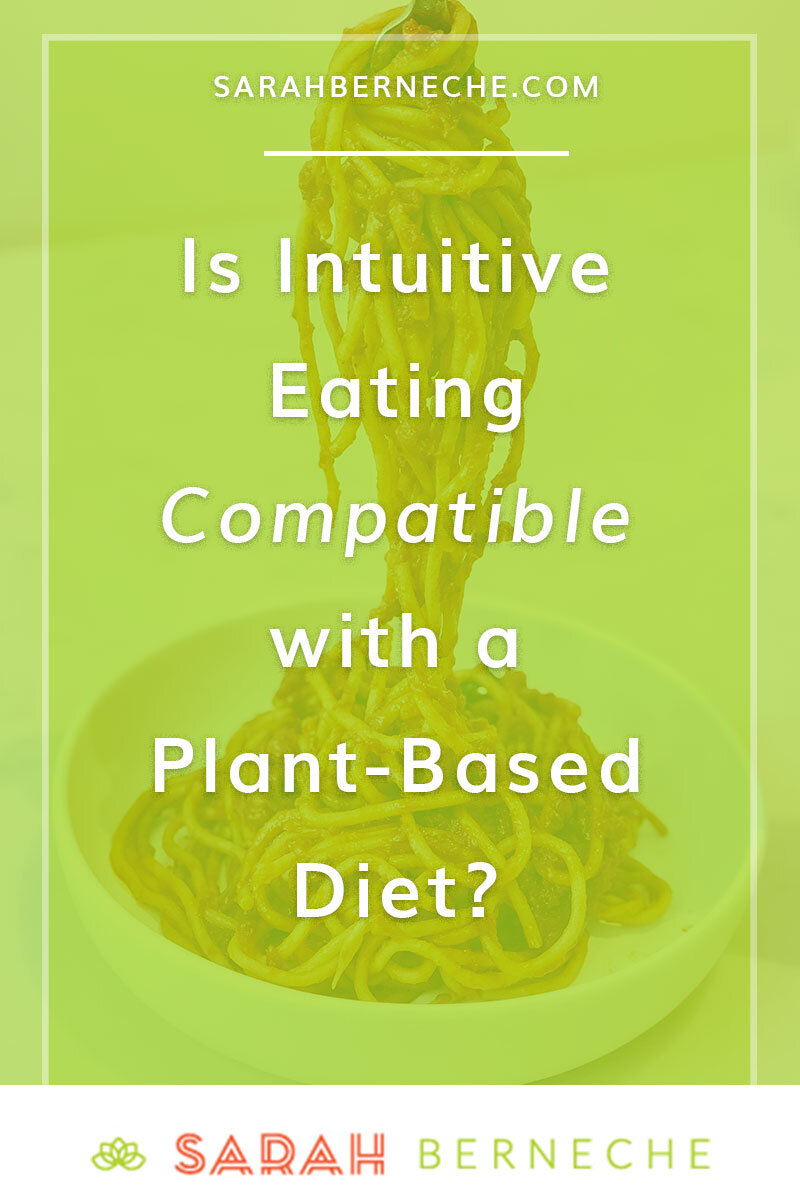One of the most common questions I’m asked is whether a vegetarian or vegan diet is compatible with intuitive eating. As plant-based diets continue to trend upward and grow in popularity, it makes sense that both new and experienced intuitive eaters are curious whether ethical restrictions can co-exist with intuitive eating. My take? In short, yes — many intuitive eaters live with food restrictions for medical, ethical, and religious reasons. Those with Celiac’s Disease must abstain from gluten to stay well. Those who are lactose-intolerant may moderate their dairy intake. Folks with diabetes may need closer monitoring of carbohydrate intake. Some folks keep kosher, and others don’t eat pork. But there are also some essential considerations to keep in mind.
Evaluate whether your desire for change is being driven by your own internal values — or external pressure.
With climate activism hotter than ever, many folks are feeling increased pressure to change their eating habits. Some are reducing their meat intake, while others are converting to vegetarianism or veganism to support the cause. I understand implicitly; many years ago, I consumed a primarily vegetarian diet because I didn’t support factory farming and wanted to help the environment. Except that I didn’t thrive. I didn’t even feel all that well. My energy was perpetually low, I lost a lot of my muscle mass, I practically dreamed of meat in my sleep, and the cravings I was promised would vanish in time never went away. Whenever I got anywhere near beef, I’d binge on it and end up feeling ashamed.
While you have permission to make the choices that most resonate with you, know that environmental concerns are systemic. An article in the Guardian explains that just 100 companies are responsible for 71% of the world’s greenhouse gas emissions, with ExxonMobil, Shell, BP, and Chevron among the highest emitters. All of this to say: converting to a plant-based diet isn’t the only way you can support climate activism, and it may not even be the most impactful way.
Clarify whether your foray into vegetarianism isn’t masking disordered eating.
While vegetarianism and intuitive eating can indeed co-exist, know that a plant-based diet is contraindicated in eating disorder recovery. I’d actually extend that to recovery from dieting and disordered eating as well. Even though it’s very possible to pursue a plant-based diet for purely ethical reasons or simply because you don’t care for meat, many folks flock to veganism as a way to normalize or hide restrictive tendencies. During my near-vegetarian days, I was most definitely obsessed with my body’s size and shape. Because vegetarians tend to have a lower body mass index (BMI), I was convinced a vegetarian diet would make me smaller. It made it easier to restrict and choose foods that aligned with my disorder.
One crucial question to ask yourself is this: Would you still choose a plant-based diet if your weight increased? If ethics genuinely drives the decision, your weight won’t play nearly the role that it would if you were contemplating a plant-based diet for weight loss purposes. It may be wise to consult with an eating disorder professional if you’re unsure whether a plant-based diet is proper for you. And for those who are uncertain, know that nothing is set in stone and there’s no rush to make a decision; you can always return to a more plant-based way of eating after you’ve recovered. I’ve supported clients through transitions from an omnivorous diet to a plant-based one and vice versa, and some folks opt for a more flexible approach, incorporating more vegetarian dishes but feeling best continuing to include animal products. It doesn’t have to be all-or-nothing. You can enjoy bean tacos with guacamole and a steak with mushrooms, or pasta marina with garlic bread and a chicken salad. You can love vegan restaurants and the steakhouse downtown. That’s the beauty of intuitive eating — and of personal choice.
There’s also the wellness industrial complex to consider. As some clean eating proponents feel meat and dairy aren’t “clean,” consider whether your interest in plant-based eating is rooted in ethical concern or because you’re still unconsciously dieting, fanning the flames of your disordered eating. Are you open to eating fake meats and other plant-based substitutes? Avoiding anything “unclean” can be a sign your decision is at least partly rooted in diet culture.
The same goes for opting for grass-fed or organic meat. Are you making these choices because they’re essential (and available) to you, or because you feel pressure to make the “right” choice? No one can answer these questions but you, but I hope to give you some food for thought on incorporating a more plant-based approach into your intuitive eating journey.
Know that there isn’t any one diet that works best for everyone.
Most importantly, know that while there are well-studied benefits to eating a more plant-based diet, there’s no one diet that works for everyone. You can include some “vegetarian behaviours” like eating more vegetables, switching up your protein sources, and consuming fibre-rich foods without putting a label on it or giving up animal products entirely. As I alluded to earlier in my own case, not everyone thrives on a plant-based diet. Just because vegetarianism is widely touted doesn’t mean you need to be plant-based to be healthy. And just because you eat a plant-based diet doesn’t by extension mean you’ll never be diagnosed with a chronic disease or experience ill-health.
What do you think? Do you have any questions about a plant-based diet and intuitive eating? Anything I missed?

Comments +